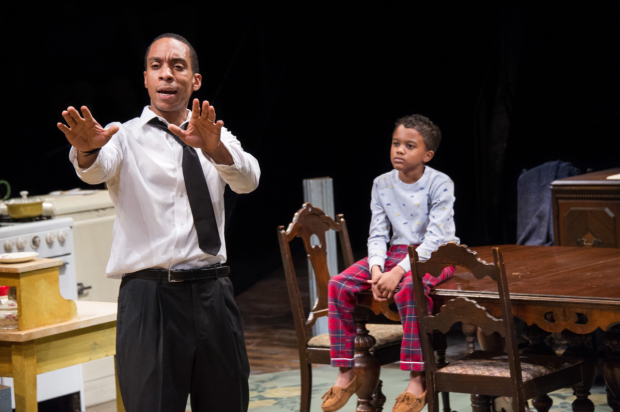A Raisin in the Sun

(© C. Stanley Photography)
When Lorraine Hansberry's A Raisin in the Sun debuted on Broadway in 1959, there were many outstanding firsts associated with the production: It was the first play by a black woman to be performed on Broadway and the first to be directed by a black director. It was nominated for four Tony Awards and launched the career of a young actor named Sidney Poitier. Now, Arena Stage is presenting an outstanding production of the play, one that proves the power and longevity of Hansberry's writing.
A Raisin in the Sun tells the story of the Youngers, an African-American family living in a cramped tenement on Chicago's South Side. Their two-bedroom apartment accommodates the family's matriarch, Lena; her son, Walter Lee; her daughter, Benethea; Walter's wife, Ruth; and their 10-year-old son, Travis.
When an unexpected insurance payout of $10,000 arrives following the death of Lena's husband, for a moment it seems that there is hope for the Younger family, until their dreams for how that money should be used begin to conflict with one another. Lena wants a house big enough for her family, with a plot of land so she can garden. Walter, a limousine driver, wants to open a liquor store and become a businessman. Benethea wants to become a doctor and needs money for medical school. Ruth wants nothing more than to move away from their tiny apartment, where Travis has to sleep on the living room couch.
But the money officially belongs to Lena, so when she takes some of it and puts a down payment on a house with room for all her family and a small plot of land for a garden, her dream seems to have been achieved. The fact that the house happens to be in a white neighborhood where the family is not welcome creates continuing drama, as does the fact that representatives of the neighborhood try to pay the Youngers to keep them from moving in.
Lizan Mitchell is stunning as Lena, small in stature but indefatigable. Mitchell's Lena still shapes and perfects her children when they stray from her vision of what a strong human being must be, even as she relentlessly spoils her beloved grandson. Will Cobbs offers a sensitive interpretation of Walter Lee, showing both his negative instincts when he feels only despair and his delightfully free-spirited instincts when he sees hope in his future.
Dawn Ursula is sensational as Ruth. She capably conveys the character's the concern, delight, anxiety, and love, suggesting Ruth's rich emotional core. Joy Jones is charming as Benethea, sincere in her desire to try everything, including guitar lessons. As she weighs the advantages of her very different suitors – the American George Murchison and the Nigerian Joseph Asagai – Jones makes it clear that her Benethea will choose to be an independent woman, and she will do so perhaps in concert with a man, but not by depending on one.
Bueka Uwemedimo turns in a muscular performance as the charming and intelligent Asagai, a man who is clearly devoted to Benethea and who has a worldview not available to the Youngers. In his Nigerian village, the "exceptional" man can read a paper. Keith Royal Smith is equally fine as the wealthy but shallow Murchison, a man whom Benethea would never marry. Jeremiah Hasty is delightful as Travis, who watches his father become a man at the end of the play.
Tazewell Thompson directs Raisin with speed and spirit. Donald Eastman's set in Act 1 shows the living room, dining room, and tiny kitchen of the Younger's home, complete with worn, old furniture. Act 2 shows the same space full of large wooden packing boxes ready for the move. Costume designer Harry Nadal dresses the cast in perfectly early 1950s-era clothing.
The title of the play comes from a poem by Langston Hughes: "What happens to a dream deferred?/Does it dry up/like a raisin in the sun?" With its savvy direction and first-rate acting, this production of A Raisin in the Sun emphasizes not only how well Hansberry understood the power and importance of dreams, but also how her writing is as relevant today as it was in 1959.











